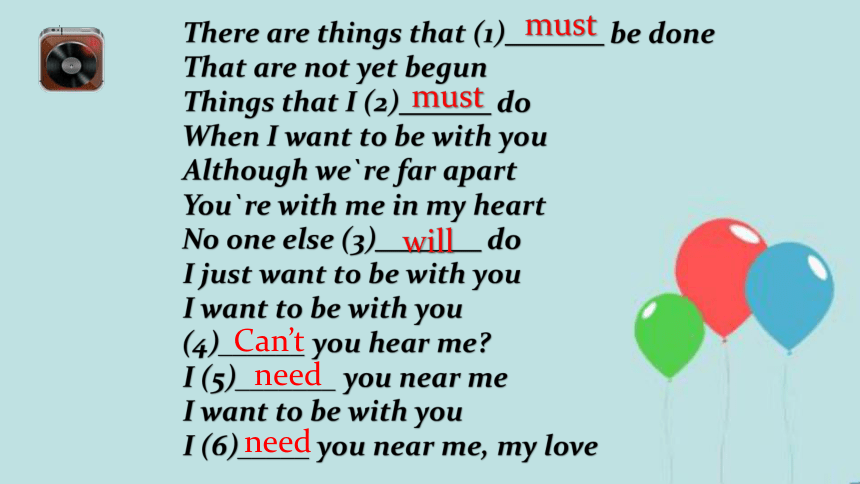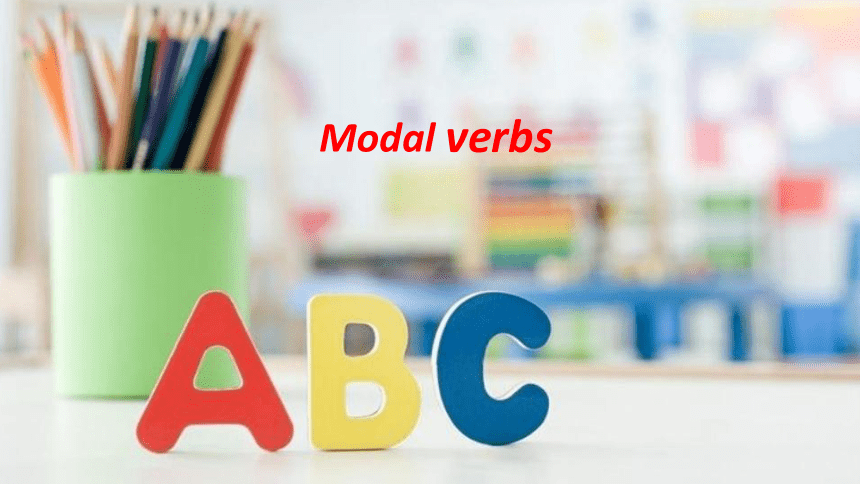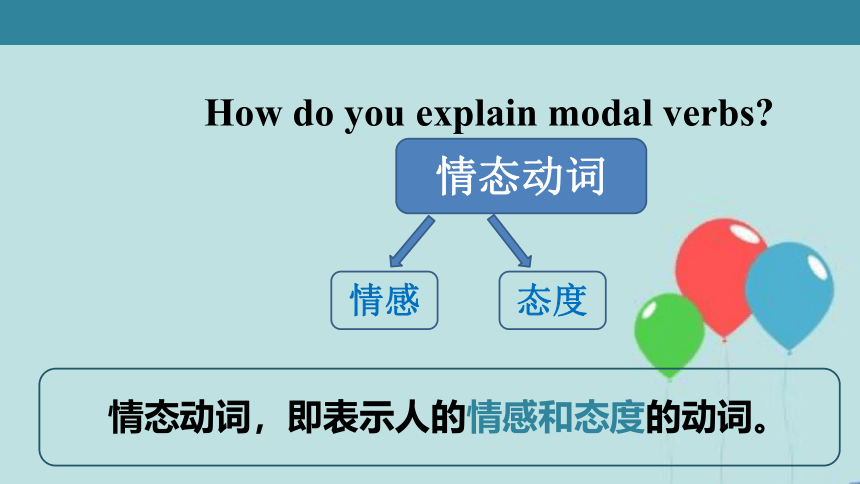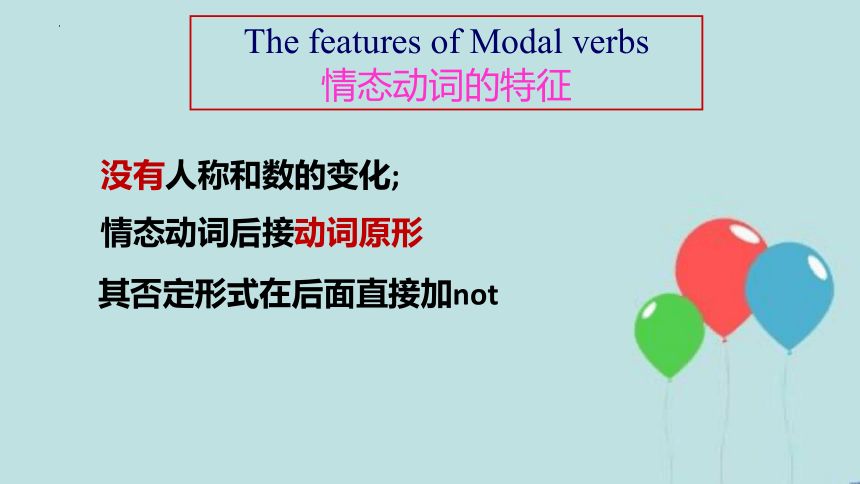译林版(2019) 必修第二册Unit 4 Exploring literature Grammar and usage 课件(共54张PPT)
文档属性
| 名称 | 译林版(2019) 必修第二册Unit 4 Exploring literature Grammar and usage 课件(共54张PPT) |  | |
| 格式 | pptx | ||
| 文件大小 | 21.2MB | ||
| 资源类型 | 教案 | ||
| 版本资源 | 牛津译林版(2019) | ||
| 科目 | 英语 | ||
| 更新时间 | 2024-03-30 18:01:45 | ||
图片预览












文档简介
(共54张PPT)
Unit 4
Exploring literature
Grammer
There are things that (1) be done
That are not yet begun
Things that I (2) do
When I want to be with you
Although we`re far apart
You`re with me in my heart
No one else (3) do
I just want to be with you
I want to be with you
(4)______ you hear me
I (5)_______ you near me
I want to be with you
I (6)_____ you near me, my love
must
must
will
Can’t
need
need
Modal verbs
How do you explain modal verbs
情态动词
情感
态度
情态动词,即表示人的情感和态度的动词。
The features of Modal verbs
情态动词的特征
没有人称和数的变化;
其否定形式在后面直接加not
情态动词后接动词原形
What Modal Verbs do you know
Modal verbs
could
may
might
shall
should
have to
must
would
will
can
Can 和 Could
1. 表能力
He can eat a bucket of rice.
Can the news be true
I think it can’t be true.
2. 表推测,“可能” ,用于疑问句或否定句
Can/Could I use your dictionary
Could you lend me a hand
3. 表请求或许可(表请求时,could比can语气更委婉)
Jack ___________ swim when he was born
NEXT
couldn’t
Jack couldn’t swim when he was born
but he _________ swim really fast now.
NEXT
can
My aunt _____jump high. She was the best.
NEXT
could
May 和 Might
1. 表许可或征询对方许可
May I come in
Where is he from
He may/might be from Changsha.
2.表把握不大的推测,”或许””可能”,常用于肯定句,might比may可能性小
(口语中常用might代may表委婉语气)
3. 表祝愿,多用于祈使句
May you get more than you wish for every year.
You _______ well be right.
may
may
might
NEXT
The teacher says we ______ leave when we've finished.
may
may
might
NEXT
shall 和 should
(1)用于第一、三人称的疑问句,表征求对方的意见
(2)用于第二、三人称的陈述句,表命令、警告等
1.shall
2.should
(1)表劝告、建议,“应该”
(2)表推测,“想必一定,按理应该”
(3)用于表示惊异、赞叹、不满, ”竟然””竟会”
Why should you be so late today?
The young should respect the old.
They should be there by now.
Shall I pick you up tomorrow
You shall do as I tell you.
THE TRUTH MACHINE
TRUE
FALSE
shall
should
It is too late,_______we begin our meeting
shall
THE TRUTH MACHINE
TRUE
FALSE
shall
It’s sunny and hot today.
They __________ put some sun cream on.
should
should
THE TRUTH MACHINE
TRUE
FALSE
shall
It’s a great film.
You __________ go and see it.
should
should
will 和 would
1. 表意志、意愿
Would you like a cup of tea
2.表请求或建议
,would比will委婉、客气
I will tell you all about it.
Will you lend me your book
I’ll never do that again.
(2)must的否定形式为must not (mustn’t), “不准” “禁止”
must 和 have to
(1)表义务、必要性、命令等,“必须”
The work must be finished as soon as possible.
You mustn’t smoke in public places.
1.must
Must I be home before nine o’clock, Mum
Yes, you must.
No, you needn’t/don’t have to.
You must be tired after such a long walk.
(3)表把握很大的肯定推测,“一定,准是”,一般只用于肯定句中
must 和 have to
have to的意思接近must,must更强调说话者的主观意愿;have to强调客观上的必要性,“不得不”
2.have to
-- Must he come to sign this paper himself
-- Yes, he .
A. need B. must C. may D. will
B
The last bus left,and I _____walk home.
had to
must
can’t
may
should
have to
can
NEXT
shouldn’t
………………………… obey the traffic rules.
must
Everybody
公众号:Englishare
must
can’t
may
mustn’t
have to
can
NEXT
shouldn’t
………………………… go.
have to
Oh, it’s too late. Sorry, I
ought to
表义务,意为“应该”(因责任、义务等该做),语气比should稍重。
You are his father. You ought to take care of him.
You oughtn’t to smoke so much.
双性动词need, dare
1. need 可以作实义动词或情态动词。
(1)情态动词,表“需要”,否定句中needn’t 不必,没必要
You needn’t hurry as there’s plenty time left.
(2)实义动词,表“需要”,否定doesn’t/don’t need
need to do 需要做某事
need doing=need to be done需要被做…
双性动词need, dare
2. dare可以作实义动词或情态动词。
情态动词,“敢”,否定句,疑问句中过去式dared,否定式daren’t
How dare you let your little child go out alone
实义动词,“敢”后面接to do sth
He dared to travel broad when he was young.
Can/Could 表能力 表推测 表请求、许可
May/Might 表推测 表许可
Shall/Should 征求意见(一、三)? 命令、警告(二、三)。 表建议(应该) 表推测(想必一定) 表惊讶、赞叹、不满
“竟会”
Will/Would 表意愿 表建议 would比will 更委婉
Must/Have to 表义务、必要性(必须) 表推测 客观/主观
Ought to 因责任义务(应该)
Need/Dare 双性动词
情态动词基本语法功能:
用法 请求/许可 可能/推测 义务/职责 意图/打算 意愿/愿意 意志/决心 才能/能力
can/could √ √ √
may/might √ √
shall/should √ √ √ √ √ √
will/would √ √ √ √ √
must √ √
ought to √ √
Ⅰ.用适当的情态动词填空:
1.I can play football. __________you swim
2.Don’t worry. You ________ return me this book tomorrow.
3.My grandma is ill. You _______ talk so loudly here .
4.I can’t play with you. I __________finish my homework first.
5.I__________ get up early tomorrow,because I have a meeting.
6.______________you please open the window
Can
may/can
can’t
must
have to
Can/Could
考点补充:情态动词+ have done 的其他用法
should/ought to have done
表过去本该做却没有做
shouldn’t/ ought not to have done
表过去本不该做却做了
could have done
表本可以/本可能做某事却没做
You should have prepared for the exam, but you spent your time playing.
You shouldn’t have watched that movie — it’ll give you horrible dreams.
You could have done better,but you were too careless.
What shall I read
Douban book review
People's Daily
Ministry of Education
Find sentences with modal verbs
Read the website article on page 48 to complete the mind map below.
Look for books on topics that
you.
Ask to recommend books.
Read book reviews in .
Develop your own .
taste
friends, parents
and teachers
newspapers,in magzines or online
interest
“What 1. I " You 2. yourself this question more than once. If you are not sure what to read, you 3.
ideas from different sources, but it is also important to develop your own taste.
To start with, ask your friends, parents and teachers to recommend what books you 4. . Most people will be happy to share their favourite books with others. Teachers in particular
5. suggestions for interesting reading materials that
6. in the library or bookshop easily. You 7. also
book reviews in newspapers, in magazines or online. A book review 8. often you whether a book is worth reading or not.
shall read
might have asked
can get
ought to read
can provide
can be found
could
read
can
tell
These ideas 9. you in the right direction, However, you
10. also for yourself what kind of books to read. You
11. a book just because everyone recommends it. Instead, look for books on topics that interest you. Take time to look through the collections in different sections of your local library,and you are likely to come across books you love to read. Over time, you 12. yourself better able to seek out books to your taste and enjoy reading all the more.
should point
must decide
do not have to read
may find
Pharses
1.不止一次
2.首先
3.特别;尤其
4.值得做某事
5.浏览
6.有可能做...
7.偶然发现
8.慢慢地
9.物色到;挑选出
10.更加
1.more than once
2.to start/begin with
3.in particular
4.be worth doing
5.look through
6.be likely to do
7.come across
8.over time
9.seek out
10.all the more
ought to modal v. 应该,应当
ought to do sth=should do sth = be supposed to do sth
应当做某事
You ought to hand in homework in time.
You ought to have handed in your homework yesterday.
particular adj. 特别的,格外的;特指的;挑剔的
in particular 尤其,特别
particularly adv. 特别地;尤为;格外
be particular about/over... 讲究;对……挑剔
她对衣着特别挑剔。
She's very particular about her clothes.
他特别喜爱科幻小说。
He loves science fiction in particular.
今天特别热。
It is particularly hot today.
suggestion ability necessity possibility
1.What shall I read
2.You might have asked yourself this question more than once.
3.If you are not sure what to read, you can get ideas from different sources.
4.To start with, ask your friends, parents and teachers to recommend what books you ought to read.
5.Teachers in particular can provide suggestions for interesting reading materials that can be found in the library or bookshop easily.
suggestion
possibility
suggestion
necessity
ability
suggestion ability necessity possibility
6.You could also read book reviews in newspapers, in magazines or online.
7.A book review can often tell you whether a book is worth reading or not.
8.These ideas should point you in the right direction.
9.However, you must also decide for yourself what kind of books to read.
10.You do not have to read a book just because everyone recommends it.
11.Over time, you may find yourself better able to seek out books to your taste and enjoy reading all the more.
suggestion
ability
possibility
necessity
necessity
necessity
1.suggestion
shall/can/could+动原
2.ability
can + 动原
3.necessity
ought to/must/don’t have to + 动原
4.possibility
might have done
should/may+动原
certainty 确定性
might may could can should ought to will must
very uncertain
非常不确定
almost certain
几乎确定
Working out the rules
Model verbs can express ability or necessity. They can also make suggestions or describe the probability of an event. The same modal verb can have different functions.
Modal verbs can be followed by _____________.
You can choose more than one answer for the blank.
a do(the base form) d be done(the passive voice)
b doing(the verb-ing form) e be doing(the continuous form)
c did (the past form) f have done (the perfect form)
a, d, e, f
情态动词不能单独作谓语, 只能跟动词原形构成复合谓语。
情态动词
1.本身有词义,不能单独作谓语。
2.与动词原形构成谓语。
3.表示说话人的情绪、态度、语气。
Applying the rules P49
B1 For the following groups of three sentences, tick the sentence which uses the modal verb differently from the other two.
a Can I keep the book for more than two weeks
b Nick can read more in an afternoon than I can in a week!
c Can Mary finish War and Peace in a month
a I am afraid I may be unable to finish this novel today.
b It may be difficult for people to agree on what good literature is.
c You may go to the library tomorrow afternoon, if you have time.
√
√
request
ability
ability
possibility
possibility
suggestion
Applying the rules
B1 For the following groups of three sentences, tick the sentence which uses the modal verb differently from the other two.
a I must finish writing the book review and hand it in before Wednesday.
b You must be tired after three hours’ reading.
c Students must develop the habit of reading classic literature.
a Henry should be reading books in the library.
b I have fifty dollars—that should be enough for three books.
c Reading English novels has greatly increased my vocabulary — you should try it too.
√
√
necessity
possibility
necessity
possibility
possibility
suggestion
B2 Below is an entry in a student’s reading plete the entry with the correct model verbs in brackets.
When my English teacher suggested that I read Charles Dickens’s A Christmas Carol, I thought, “I (1) (can’t/shouldn’t) read this! It (2) (has to/must) be very boring.” Surprisingly, it turned out the exact opposite. I (3) (could/might) not stop turning the pages!
The book’s main character is Scrooge, a rich but mean old man. He hates all kinds of celebrations. On Christmas eve, he is transported to different points in his life by three spirits. In the end, he reflects on these moments and realizes his mistakes. Then he decides that he (4) (might/must) change himself. On Christmas morning, he sends a large turkey to a poor man for Christmas dinner. He also tries to make his family and friends happy by spending time with them.
can’t
must
could
must
B2 Below is an entry in a student’s reading plete the entry with the correct model verbs in brackets.
There is something that (5) (can/must) be learnt from A Christmas Carol: we (6) (should/may) treat others with kindness, generosity and love. I think everyone (7) (would/ought to) read this book.
can
should
ought to
mean adj. 吝啬的,小气的;不善良的,刻薄的
be mean to sb 对某人刻薄
mean to do sth 打算做某事
mean doing sth 意味着做某事
be meant to do sth 注定做某事
means
meaning
meaningful
transport vt. 运输,运送
n. 交通运输系统;交通车辆;运输
transport system 运输系统
transport goods 运送货物
trans- 转变, 变换; 超过,横跨
transfer 转移;调动;转让;transform 改变形态,改变外观 translate 翻译
transplant 移植
血把氧气输送到全身。
Blood transports oxygen around the body.
自行车是他唯一的代步工具。
His bike is his only means of transport.
turkey n. 火鸡;火鸡肉
generosity n. 慷慨,大方,宽宏大量
Turkey n. 土耳其
generous adj.
be generous with… 在......慷慨/大方
be generous in... 乐于......
他在时间和金钱方面慷慨大方。
He is generous with time and money.
他一直乐于分享自己丰富的知识。
He was always generous in sharing his rich knowledge.
C Fill in the blanks with the correct forms of the verbs in the brackets, using the proper modal verbs. P76
1.— What’s the weather like in your hometown Is it cold in winter
— Yes, it (be) as cold as -30℃ in winter.
2. — I want to invite Tom to see a film tonight. Has he arrived yet
— Yes, he just arrived. But after four hours’ ride, he ______________ (be) tired now and he (prefer) to stay in tonight.
3. — Is Betty still playing the piano
— Yes. I asked her to stop and take a rest, but she______________ (not listen).
can be
must/may/might be
wouldn’t listen
may/might prefer
C P76
4.—What does the rule say about using the reading room
— No one (talk) loudly.
5.— Your car looks great. It (cost) you a lot of money.
— Yes, it’s quite expensive.
6.— How long can I keep the book
— The books that students borrow (return) to the library within two weeks.
shall/should talk
must have cost
must/shall be returned
Unit 4
Exploring literature
Grammer
There are things that (1) be done
That are not yet begun
Things that I (2) do
When I want to be with you
Although we`re far apart
You`re with me in my heart
No one else (3) do
I just want to be with you
I want to be with you
(4)______ you hear me
I (5)_______ you near me
I want to be with you
I (6)_____ you near me, my love
must
must
will
Can’t
need
need
Modal verbs
How do you explain modal verbs
情态动词
情感
态度
情态动词,即表示人的情感和态度的动词。
The features of Modal verbs
情态动词的特征
没有人称和数的变化;
其否定形式在后面直接加not
情态动词后接动词原形
What Modal Verbs do you know
Modal verbs
could
may
might
shall
should
have to
must
would
will
can
Can 和 Could
1. 表能力
He can eat a bucket of rice.
Can the news be true
I think it can’t be true.
2. 表推测,“可能” ,用于疑问句或否定句
Can/Could I use your dictionary
Could you lend me a hand
3. 表请求或许可(表请求时,could比can语气更委婉)
Jack ___________ swim when he was born
NEXT
couldn’t
Jack couldn’t swim when he was born
but he _________ swim really fast now.
NEXT
can
My aunt _____jump high. She was the best.
NEXT
could
May 和 Might
1. 表许可或征询对方许可
May I come in
Where is he from
He may/might be from Changsha.
2.表把握不大的推测,”或许””可能”,常用于肯定句,might比may可能性小
(口语中常用might代may表委婉语气)
3. 表祝愿,多用于祈使句
May you get more than you wish for every year.
You _______ well be right.
may
may
might
NEXT
The teacher says we ______ leave when we've finished.
may
may
might
NEXT
shall 和 should
(1)用于第一、三人称的疑问句,表征求对方的意见
(2)用于第二、三人称的陈述句,表命令、警告等
1.shall
2.should
(1)表劝告、建议,“应该”
(2)表推测,“想必一定,按理应该”
(3)用于表示惊异、赞叹、不满, ”竟然””竟会”
Why should you be so late today?
The young should respect the old.
They should be there by now.
Shall I pick you up tomorrow
You shall do as I tell you.
THE TRUTH MACHINE
TRUE
FALSE
shall
should
It is too late,_______we begin our meeting
shall
THE TRUTH MACHINE
TRUE
FALSE
shall
It’s sunny and hot today.
They __________ put some sun cream on.
should
should
THE TRUTH MACHINE
TRUE
FALSE
shall
It’s a great film.
You __________ go and see it.
should
should
will 和 would
1. 表意志、意愿
Would you like a cup of tea
2.表请求或建议
,would比will委婉、客气
I will tell you all about it.
Will you lend me your book
I’ll never do that again.
(2)must的否定形式为must not (mustn’t), “不准” “禁止”
must 和 have to
(1)表义务、必要性、命令等,“必须”
The work must be finished as soon as possible.
You mustn’t smoke in public places.
1.must
Must I be home before nine o’clock, Mum
Yes, you must.
No, you needn’t/don’t have to.
You must be tired after such a long walk.
(3)表把握很大的肯定推测,“一定,准是”,一般只用于肯定句中
must 和 have to
have to的意思接近must,must更强调说话者的主观意愿;have to强调客观上的必要性,“不得不”
2.have to
-- Must he come to sign this paper himself
-- Yes, he .
A. need B. must C. may D. will
B
The last bus left,and I _____walk home.
had to
must
can’t
may
should
have to
can
NEXT
shouldn’t
………………………… obey the traffic rules.
must
Everybody
公众号:Englishare
must
can’t
may
mustn’t
have to
can
NEXT
shouldn’t
………………………… go.
have to
Oh, it’s too late. Sorry, I
ought to
表义务,意为“应该”(因责任、义务等该做),语气比should稍重。
You are his father. You ought to take care of him.
You oughtn’t to smoke so much.
双性动词need, dare
1. need 可以作实义动词或情态动词。
(1)情态动词,表“需要”,否定句中needn’t 不必,没必要
You needn’t hurry as there’s plenty time left.
(2)实义动词,表“需要”,否定doesn’t/don’t need
need to do 需要做某事
need doing=need to be done需要被做…
双性动词need, dare
2. dare可以作实义动词或情态动词。
情态动词,“敢”,否定句,疑问句中过去式dared,否定式daren’t
How dare you let your little child go out alone
实义动词,“敢”后面接to do sth
He dared to travel broad when he was young.
Can/Could 表能力 表推测 表请求、许可
May/Might 表推测 表许可
Shall/Should 征求意见(一、三)? 命令、警告(二、三)。 表建议(应该) 表推测(想必一定) 表惊讶、赞叹、不满
“竟会”
Will/Would 表意愿 表建议 would比will 更委婉
Must/Have to 表义务、必要性(必须) 表推测 客观/主观
Ought to 因责任义务(应该)
Need/Dare 双性动词
情态动词基本语法功能:
用法 请求/许可 可能/推测 义务/职责 意图/打算 意愿/愿意 意志/决心 才能/能力
can/could √ √ √
may/might √ √
shall/should √ √ √ √ √ √
will/would √ √ √ √ √
must √ √
ought to √ √
Ⅰ.用适当的情态动词填空:
1.I can play football. __________you swim
2.Don’t worry. You ________ return me this book tomorrow.
3.My grandma is ill. You _______ talk so loudly here .
4.I can’t play with you. I __________finish my homework first.
5.I__________ get up early tomorrow,because I have a meeting.
6.______________you please open the window
Can
may/can
can’t
must
have to
Can/Could
考点补充:情态动词+ have done 的其他用法
should/ought to have done
表过去本该做却没有做
shouldn’t/ ought not to have done
表过去本不该做却做了
could have done
表本可以/本可能做某事却没做
You should have prepared for the exam, but you spent your time playing.
You shouldn’t have watched that movie — it’ll give you horrible dreams.
You could have done better,but you were too careless.
What shall I read
Douban book review
People's Daily
Ministry of Education
Find sentences with modal verbs
Read the website article on page 48 to complete the mind map below.
Look for books on topics that
you.
Ask to recommend books.
Read book reviews in .
Develop your own .
taste
friends, parents
and teachers
newspapers,in magzines or online
interest
“What 1. I " You 2. yourself this question more than once. If you are not sure what to read, you 3.
ideas from different sources, but it is also important to develop your own taste.
To start with, ask your friends, parents and teachers to recommend what books you 4. . Most people will be happy to share their favourite books with others. Teachers in particular
5. suggestions for interesting reading materials that
6. in the library or bookshop easily. You 7. also
book reviews in newspapers, in magazines or online. A book review 8. often you whether a book is worth reading or not.
shall read
might have asked
can get
ought to read
can provide
can be found
could
read
can
tell
These ideas 9. you in the right direction, However, you
10. also for yourself what kind of books to read. You
11. a book just because everyone recommends it. Instead, look for books on topics that interest you. Take time to look through the collections in different sections of your local library,and you are likely to come across books you love to read. Over time, you 12. yourself better able to seek out books to your taste and enjoy reading all the more.
should point
must decide
do not have to read
may find
Pharses
1.不止一次
2.首先
3.特别;尤其
4.值得做某事
5.浏览
6.有可能做...
7.偶然发现
8.慢慢地
9.物色到;挑选出
10.更加
1.more than once
2.to start/begin with
3.in particular
4.be worth doing
5.look through
6.be likely to do
7.come across
8.over time
9.seek out
10.all the more
ought to modal v. 应该,应当
ought to do sth=should do sth = be supposed to do sth
应当做某事
You ought to hand in homework in time.
You ought to have handed in your homework yesterday.
particular adj. 特别的,格外的;特指的;挑剔的
in particular 尤其,特别
particularly adv. 特别地;尤为;格外
be particular about/over... 讲究;对……挑剔
她对衣着特别挑剔。
She's very particular about her clothes.
他特别喜爱科幻小说。
He loves science fiction in particular.
今天特别热。
It is particularly hot today.
suggestion ability necessity possibility
1.What shall I read
2.You might have asked yourself this question more than once.
3.If you are not sure what to read, you can get ideas from different sources.
4.To start with, ask your friends, parents and teachers to recommend what books you ought to read.
5.Teachers in particular can provide suggestions for interesting reading materials that can be found in the library or bookshop easily.
suggestion
possibility
suggestion
necessity
ability
suggestion ability necessity possibility
6.You could also read book reviews in newspapers, in magazines or online.
7.A book review can often tell you whether a book is worth reading or not.
8.These ideas should point you in the right direction.
9.However, you must also decide for yourself what kind of books to read.
10.You do not have to read a book just because everyone recommends it.
11.Over time, you may find yourself better able to seek out books to your taste and enjoy reading all the more.
suggestion
ability
possibility
necessity
necessity
necessity
1.suggestion
shall/can/could+动原
2.ability
can + 动原
3.necessity
ought to/must/don’t have to + 动原
4.possibility
might have done
should/may+动原
certainty 确定性
might may could can should ought to will must
very uncertain
非常不确定
almost certain
几乎确定
Working out the rules
Model verbs can express ability or necessity. They can also make suggestions or describe the probability of an event. The same modal verb can have different functions.
Modal verbs can be followed by _____________.
You can choose more than one answer for the blank.
a do(the base form) d be done(the passive voice)
b doing(the verb-ing form) e be doing(the continuous form)
c did (the past form) f have done (the perfect form)
a, d, e, f
情态动词不能单独作谓语, 只能跟动词原形构成复合谓语。
情态动词
1.本身有词义,不能单独作谓语。
2.与动词原形构成谓语。
3.表示说话人的情绪、态度、语气。
Applying the rules P49
B1 For the following groups of three sentences, tick the sentence which uses the modal verb differently from the other two.
a Can I keep the book for more than two weeks
b Nick can read more in an afternoon than I can in a week!
c Can Mary finish War and Peace in a month
a I am afraid I may be unable to finish this novel today.
b It may be difficult for people to agree on what good literature is.
c You may go to the library tomorrow afternoon, if you have time.
√
√
request
ability
ability
possibility
possibility
suggestion
Applying the rules
B1 For the following groups of three sentences, tick the sentence which uses the modal verb differently from the other two.
a I must finish writing the book review and hand it in before Wednesday.
b You must be tired after three hours’ reading.
c Students must develop the habit of reading classic literature.
a Henry should be reading books in the library.
b I have fifty dollars—that should be enough for three books.
c Reading English novels has greatly increased my vocabulary — you should try it too.
√
√
necessity
possibility
necessity
possibility
possibility
suggestion
B2 Below is an entry in a student’s reading plete the entry with the correct model verbs in brackets.
When my English teacher suggested that I read Charles Dickens’s A Christmas Carol, I thought, “I (1) (can’t/shouldn’t) read this! It (2) (has to/must) be very boring.” Surprisingly, it turned out the exact opposite. I (3) (could/might) not stop turning the pages!
The book’s main character is Scrooge, a rich but mean old man. He hates all kinds of celebrations. On Christmas eve, he is transported to different points in his life by three spirits. In the end, he reflects on these moments and realizes his mistakes. Then he decides that he (4) (might/must) change himself. On Christmas morning, he sends a large turkey to a poor man for Christmas dinner. He also tries to make his family and friends happy by spending time with them.
can’t
must
could
must
B2 Below is an entry in a student’s reading plete the entry with the correct model verbs in brackets.
There is something that (5) (can/must) be learnt from A Christmas Carol: we (6) (should/may) treat others with kindness, generosity and love. I think everyone (7) (would/ought to) read this book.
can
should
ought to
mean adj. 吝啬的,小气的;不善良的,刻薄的
be mean to sb 对某人刻薄
mean to do sth 打算做某事
mean doing sth 意味着做某事
be meant to do sth 注定做某事
means
meaning
meaningful
transport vt. 运输,运送
n. 交通运输系统;交通车辆;运输
transport system 运输系统
transport goods 运送货物
trans- 转变, 变换; 超过,横跨
transfer 转移;调动;转让;transform 改变形态,改变外观 translate 翻译
transplant 移植
血把氧气输送到全身。
Blood transports oxygen around the body.
自行车是他唯一的代步工具。
His bike is his only means of transport.
turkey n. 火鸡;火鸡肉
generosity n. 慷慨,大方,宽宏大量
Turkey n. 土耳其
generous adj.
be generous with… 在......慷慨/大方
be generous in... 乐于......
他在时间和金钱方面慷慨大方。
He is generous with time and money.
他一直乐于分享自己丰富的知识。
He was always generous in sharing his rich knowledge.
C Fill in the blanks with the correct forms of the verbs in the brackets, using the proper modal verbs. P76
1.— What’s the weather like in your hometown Is it cold in winter
— Yes, it (be) as cold as -30℃ in winter.
2. — I want to invite Tom to see a film tonight. Has he arrived yet
— Yes, he just arrived. But after four hours’ ride, he ______________ (be) tired now and he (prefer) to stay in tonight.
3. — Is Betty still playing the piano
— Yes. I asked her to stop and take a rest, but she______________ (not listen).
can be
must/may/might be
wouldn’t listen
may/might prefer
C P76
4.—What does the rule say about using the reading room
— No one (talk) loudly.
5.— Your car looks great. It (cost) you a lot of money.
— Yes, it’s quite expensive.
6.— How long can I keep the book
— The books that students borrow (return) to the library within two weeks.
shall/should talk
must have cost
must/shall be returned
